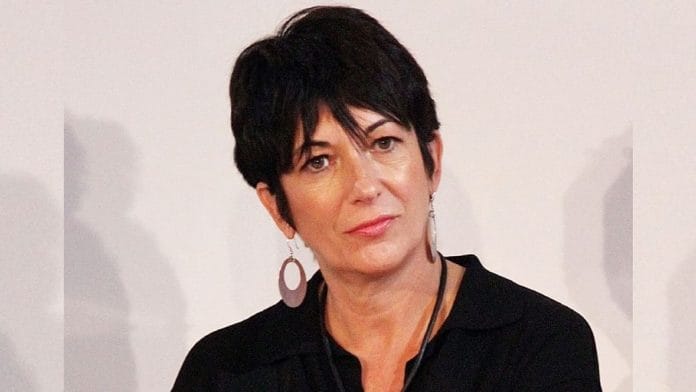The judge in Ghislaine Maxwell’s sex-trafficking trial asked prosecutors and defense lawyers to brief her on whether a new trial is needed over press comments made by a juror.
U.S. District Judge Alison Nathan issued an order Wednesday after Maxwell’s lawyers told her earlier that they would seek a new trial because the juror failed to disclose a possible bias against her.
“The juror told reporters that he disclosed to the other members of the jury during deliberations that he was a victim of sexual abuse and further described his memory of those events,” Maxwell lawyer Christian Everdell wrote in a letter to the judge. “According to the juror, his disclosure influenced the deliberations and convinced other members of the jury to convict Ms. Maxwell.”
Prosecutors had earlier asked Nathan to investigate the juror’s comments, and Nathan in her order also asked both sides to provide written arguments on “whether an inquiry of some kind is permitted and/or required, and, if so, the nature of such an inquiry.”
Todd Spodek, an attorney representing the juror, said he was “just getting things together and not commenting at this time,” he said.
The judge had ruled before the trial that the names of jurors wouldn’t be released publicly.
As the lawyers battled over the one juror’s remarks, the New York Times reported Wednesday afternoon that it had interviewed another juror who said they had been a victim of sexual abuse and discussed it during the deliberations that led to Maxwell’s conviction.
The developments could endanger a verdict that was widely hailed as offering long-delayed justice to victims of Jeffrey Epstein. Maxwell, 60, was convicted of luring and grooming underage girls for sexual abuse by Epstein and participating in some of the abuse herself. She faces up to 40 years in prison for sex-trafficking, the most serious of the five counts on which she was found guilty.
The first juror to come forward, identified by press outlets only by his first and middle names, Scotty David, said in interviews with The Independent, Reuters, and the Daily Mail that he was a victim of sexual abuse as a child. He told Reuters that he didn’t recall being asked about his experiences during jury selection. He also said his story helped sway some jurors who questioned the accuracy of Maxwell’s accusers, and told The Daily Mail that he wasn’t the only juror who’d shared stories of being sexually abused.
‘Sailed through’
He also claimed in one interview that he’d “sailed through” jury selection without ever being asked by the judge or lawyers if he was a victim of sexual abuse.
A 30-page jury questionnaire all prospective jurors were required to fill out ahead of the selection process pointedly asked potential jurors if they or anyone close to them had ever been victims of sexual assault or sexual abuse. Those potential jurors who answered in the affirmative were later subjected to further questioning by the judge and lawyers behind closed doors.
Scotty David was not subjected to such questioning and didn’t mention any sexual abuse history in an interview by Nathan, a review of the trial transcript shows.
Prosecutors on Wednesday asked Nathan to first hold a nonpublic hearing and question the juror about his comments, especially his claim he was never asked about any history of sexual assault or abuse.
“Assuming the accuracy of the reporting, the juror asserted that he ‘flew through’ the prospective juror questionnaire and does not recall being asked whether he had been a victim of sexual abuse, but stated that ‘he would have answered honestly,’” prosecutor Maurene Comey said.
New trial
A number of legal experts have suggested that a juror lying in response to that question could possibly result in a new trial for Maxwell, or at least an inquiry by the court. In 2015, four convictions in what was then the biggest criminal tax-fraud case ever to go to trial were thrown out after it was learned that an alcoholic, suspended lawyer lied to get on the jury. A court in New York found that the juror had hidden her past as a suspended lawyer, lied about her address and failed to disclose more than five arrests.
However, Moira Penza, a former federal prosecutor in New York who’s handled sex crimes cases, said courts rarely grant such requests. She said Nathan would likely question the juror outside the public’s presence.
“Judge Nathan would make an assessment of whether the omission was purposeful and whether it impacted the juror’s ability to be fair and impartial, and whether he still was able to follow the Court’s instructions and go into deliberations keeping an open mind,” Penza said.
“Right now this juror is being quoted as saying he missed the question and did not purposely conceal the fact of this sexual abuse. If the Judge credits that, it could be the end of the inquiry, given, among other things, the length and complexity of the questionnaire.”
Four women testified at her trial that they were abused as teenagers by Maxwell and Epstein. Scotty David told the Daily Mail that he approached the trial with an open mind about Maxwell but eventually decided she was as guilty as Epstein.
“I don’t want to call her a monster, but a predator is the right word,” he told the tabloid.-Bloomberg
Also read: British socialite Ghislaine Maxwell convicted in Epstein sex abuse case, faces years in prison






